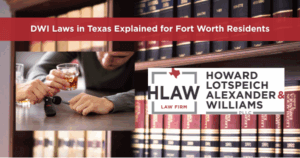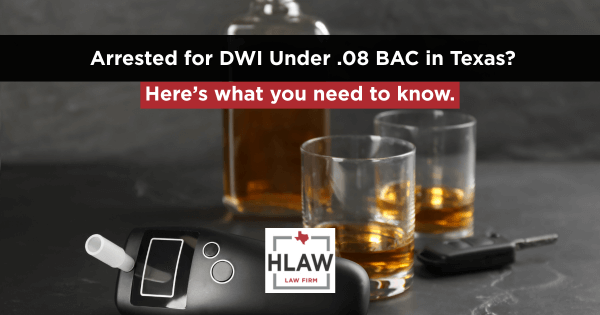
DWI laws in Texas reviewed by Fort Worth’s HLAW: Helping residents understand blood alcohol limits, penalties, and legal rights
Let’s face it, understanding DWI laws in Fort Worth, Texas, can feel overwhelming. Driving while intoxicated in Texas carries serious legal risks and personal consequences for Fort Worth and Tarrant County residents. But don’t worry, getting a handle on these laws empowers you to protect your rights, minimize penalties, and navigate court procedures with confidence. In this guide, we’ll break down seven key areas: what DWI means, the penalties you could face, how the arrest process works, common defense strategies, how to get your license back, the difference between DWI and DUI, and where to find legal help.
You’ll also discover how Texas defines intoxication levels, the escalating consequences of repeat offenses, and practical steps you can take to challenge test results.
If you’re looking for Fort Worth DWI attorney services (like our team at HLAW, who have represented individuals charged with DWI for over 13 years), understanding these topics forms the foundation for informed decisions and effective legal representation.
What Are the Key DWI Laws in Texas That Fort Worth Residents Should Know?
Driving While Intoxicated (DWI) in Texas simply means operating a motor vehicle in a public place with a blood alcohol concentration (BAC) of 0.08 percent or higher, or while under the influence of any controlled substance. These laws, primarily found under Texas Penal Code Section 49.04, are in place to keep everyone safe on the roads and deter impaired driving. They give police clear rules for enforcing charges and help courts handle DWI cases consistently. This clarity also helps you understand how evidence, like breathalyzer results and sobriety assessments, might be used in your case.
Understanding the foundational legal framework for DWI in Texas is your first step.
Below are the principal elements of Texas DWI statutes:
- BAC Limits: Legal blood alcohol concentration limits for drivers, as defined in Texas Penal Code Section 49.01(2)(B).
- “Intoxication” Definition: Official definitions of “intoxication” covering alcohol and drugs, detailed in Texas Penal Code Section 49.01(2)(A).
- Penalty Structures: Statutory penalties linked to offense history and BAC readings, outlined in Texas Penal Code Section 49.04 and Section 49.09.
- License Suspension Rules: Administrative rules governing license suspension under the Implied Consent law, found in Texas Transportation Code Chapter 724.
These core statutes create a consistent legal framework, setting the stage for understanding penalty scales and administrative processes in Fort Worth.
How Does Texas Define Driving While Intoxicated (DWI)?
Driving While Intoxicated in Texas isn’t just about your BAC level; it’s also about whether alcohol or drugs are affecting your normal mental or physical abilities. According to Texas Penal Code Section 49.01(2), you’re considered intoxicated if you’ve lost the normal use of your mental or physical faculties due to alcohol, a controlled substance, or any chemical substance. So, even if your BAC is below the legal limit, you could still face a DWI charge if you’re clearly impaired. For example, a driver showing slurred speech and poor coordination might be prosecuted even if their BAC is under 0.08 percent. Knowing this “dual standard” is key for building a strong defense, especially when challenging things like an officer’s observations or field sobriety test results.
What Are the Legal Blood Alcohol Concentration (BAC) Limits in Texas?
For most drivers (21 and older), the legal BAC limit in Texas is 0.08%, as per Texas Penal Code Section 49.01(2)(B). For commercial drivers, that limit drops to 0.04% (Texas Transportation Code Section 522.081), and for drivers under 21, any detectable amount of alcohol is illegal (Texas Alcoholic Beverage Code Section 106.041). These different limits show how serious Texas is about preventing underage drinking and ensuring professional drivers are sober. If your BAC is at or above these limits, it’s considered automatic proof of intoxication, and it’s up to you to prove the test was wrong. Knowing these different limits helps you understand the evidence against you and explore ways to challenge the accuracy of the tests.
BAC limits are strictly enforced across different driver categories in Texas.
These numerical limits guide legal strategies for contesting breathalyzer calibration, chain-of-custody issues, and officer training procedures.
Which Substances Are Included Under Texas DWI Laws?
Texas DWI laws aren’t just about alcohol. They also cover controlled substances, prescription medications, and even inhalants that impair your driving ability. The legal definition of “intoxicated” is pretty broad in Texas Penal Code Section 49.01(2)(A), including “not having the normal use of mental or physical faculties by reason of the introduction of alcohol, a controlled substance, a drug, a dangerous drug, a combination of two or more of those substances, or any other substance into the body.” This means driving while impaired by drugs like narcotics, hallucinogens, or even synthetic drugs carries the same legal weight as alcohol. For instance, operating a vehicle while impaired by prescription painkillers without a valid prescription can qualify as a DWI offense. Understanding this wide range of substances helps your legal team examine toxicology reports and lab standards when building your defense.
What Are the Penalties for DWI Offenses in Fort Worth, Texas?
If you’re convicted of a DWI in Texas, you’ll face both criminal penalties and administrative actions against your driver’s license. These can have both immediate and long-term effects. A first-time offense generally carries up to 180 days in county jail, fines up to $2,000, and a license suspension lasting 90 days to one year, as outlined in Texas Penal Code Section 49.04. This two-pronged approach aims to punish offenders and deter others, supporting public safety while encouraging compliance with Texas traffic laws. Knowing how court sentences and Department of Public Safety (DPS) actions work together helps you plan your next steps, whether that’s appealing, seeking probation, or trying to get your license back early.
DWI penalties can include jail time, fines, and license suspension.
Below is a comparison of Texas DWI penalties by offense level, primarily governed by Texas Penal Code Section 49.04 and Section 49.09 for enhanced offenses:
This structured penalty table highlights how repeat offenses escalate both criminal exposure and administrative restrictions, underscoring the importance of early legal intervention from a knowledgeable Fort Worth DWI attorney like those at HLAW.
What Are the Consequences for First-Time DWI Offenders?
Even for a first-time DWI in Fort Worth, you could be looking at up to six months in county jail, hefty fines, and mandatory educational programs like a Victim Impact Panel, as specified in Texas Penal Code Section 49.04(b). The DPS will also suspend your license, and you might have to install an ignition interlock device in your car. And it’s not just about the immediate penalties; a DWI on your record can hike up your insurance rates and make it tougher to find a job. Because of these serious consequences, many people wisely choose to work with a skilled Fort Worth DWI attorney, like the dedicated professionals at HLAW, who can help negotiate options like deferred adjudication or alternative sentencing.
How Do Penalties Escalate for Repeat DWI Offenses?
If you get another DWI, the penalties get much tougher, as detailed in Texas Penal Code Section 49.09. A second DWI conviction typically means a mandatory minimum jail sentence of 30 days, a higher maximum fine, and a longer license revocation under Section 49.09(a). A third conviction escalates to a felony, risking multi-year imprisonment and a permanent criminal record under Section 49.09(b). Each new conviction makes it harder to negotiate plea deals or get probation, so having a strong defense strategy early on is crucial to protect your freedom and future. HLAW’s attorneys, with over 13 years of experience, are adept at crafting such strategies.
Can DWI Charges Lead to Jail Time or License Suspension?
Absolutely. In Texas, a DWI conviction can definitely land you in jail and lead to an automatic license suspension. Jail time varies depending on your offense history. The DPS administratively suspends driving privileges under the Implied Consent provision, found in Texas Transportation Code Chapter 724, if you fail or refuse chemical testing. What’s important to know is that this license suspension can happen even before your criminal case is resolved in court. Knowing about these two separate processes means you can act quickly to request hearings to challenge your suspension and keep your driving privileges while your criminal case is ongoing.
How Does the DWI Arrest Process Work in Fort Worth, Texas?
The DWI arrest process in Fort Worth usually follows a clear series of steps: a traffic stop, field sobriety evaluation, chemical testing, arrest booking, and arraignment. It starts with a traffic stop, often because an officer suspects impairment or sees a traffic violation. If an officer observes signs of intoxication—such as erratic driving or slurred speech—they may request standardized field sobriety tests. If you don’t perform well on these tests, the officer will likely ask for a breath or blood test, thanks to Texas’s Implied Consent law, as detailed in Texas Transportation Code Chapter 724.
Knowing each step helps you understand your rights, challenge any mistakes made by law enforcement, and prepare for what comes next.
The DWI arrest process begins with a traffic stop based on reasonable suspicion.
Key arrest phases include:
- Initial Stop: The first traffic stop and officer observations.
- Field Sobriety Tests: Administration of standardized field sobriety tests.
- Chemical Test: Request for a chemical test (breath, blood, or urine).
- Booking: Formal arrest, booking, and fingerprinting.
- Arraignment: Scheduling for bond and plea.
This step-by-step outline clarifies where constitutional protections apply and where experienced attorneys, like those at HLAW, can contest evidence admissibility, paving the way to challenge charges effectively.
What Are Your Rights During a DWI Traffic Stop?
When you’re pulled over for a suspected DWI, you have important rights. You can remain silent and ask for a lawyer, but you must show your driver’s license, proof of insurance, and vehicle registration. You don’t have to perform field sobriety tests beyond providing your basic ID, and you can refuse these optional tests without facing criminal charges. However, refusing a breath or blood test will automatically lead to an administrative license suspension under Texas Transportation Code Section 724.035. Understanding these rights is crucial for your defense, as it can help challenge unlawful stops or if you weren’t properly read your Miranda rights during questioning.
How Is BAC Tested by Law Enforcement in Texas?
In Texas, police mainly use breathalyzer machines and blood tests to measure your BAC. Breath tests need to be carefully calibrated and maintained, and blood tests require certified lab procedures and strict documentation to track the sample. Mistakes can happen due to faulty equipment, poorly trained technicians, or even contaminated samples. Spotting these potential weaknesses can help your attorney file motions to exclude test results, which can significantly strengthen your defense cases.
What Happens After a DWI Arrest in Fort Worth?
Once you’re arrested, you’ll go through booking, face a DPS hearing about your license suspension, and have an initial court appearance called an arraignment. At the DPS suspension hearing (which usually happens within 15 days of your arrest, as per Texas Transportation Code Section 724.041), you can challenge the chemical test results and ask for a temporary driving permit. The arraignment then establishes formal charges and bail conditions. Knowing these timelines means you can act quickly, like requesting hearings and getting in touch with HLAW’s Fort Worth DWI attorney services, backed by over 13 years of dedicated defense, to start fighting the charges right away.
What Are the Legal Defenses Against DWI Charges in Texas?
When it comes to defending against DWI charges in Texas, successful strategies often involve challenging the reason for your stop, how field sobriety tests were given, and the accuracy of chemical tests. Each of these defense angles focuses on specific points where law enforcement must follow strict rules. For instance, a seasoned defense attorney from HLAW might argue that the traffic stop wasn’t justified, which could make any evidence gathered afterward inadmissible. Understanding these legal theories helps guide your case preparation and can significantly increase your chances of getting charges dismissed or reduced.
Effective legal defenses can challenge key aspects of a DWI charge.
- Challenging the Stop: Contesting probable cause for the initial traffic stop.
- Disputing FSTs: Disputing improper administration of field sobriety tests.
- Questioning BAC Tests: Challenging calibration and technician errors in BAC testing.
These defense strategies form the backbone of persuasive motions and cross-examinations that can undermine prosecution evidence and improve case outcomes.
How Can You Challenge BAC Test Results?
Challenging BAC results means taking a close look at things like breathalyzer calibration records, technician certifications, and how your sample was handled. An experienced defense attorney at HLAW could possibly file motions arguing about maintenance issues, outdated equipment certifications, or problems with the chain of custody for blood samples. If BAC evidence is successfully suppressed, prosecutors might be forced to offer reduced charges or even dismiss your case entirely.
What Role Do Field Sobriety Tests Play in DWI Cases?
Field sobriety tests (like the horizontal gaze nystagmus, walk-and-turn, and one-leg stand) are physical tasks designed to check for impairment. But even though they’re common, these tests can be subjective and influenced by things like weather, your medical conditions, or even an officer’s bias. Pointing out inconsistencies in how these tests were given – for example, if the officer didn’t follow national standardized procedures – can lead to the test results being thrown out or their importance reduced in court.
When Is It Possible to Contest the Legality of a Traffic Stop?
You can challenge a traffic stop if there wasn’t a good reason (reasonable suspicion) for it, or if the officer had a hidden motive. An officer needs a valid reason to pull you over, like seeing a traffic violation, erratic driving, or getting a credible report of impairment. If you were stopped for reasons unrelated to safety or if the officer didn’t follow proper procedures—such as running a red light without cause—your defense attorney can file motions to exclude any evidence gathered during that stop, which can significantly weaken the prosecution’s case.
What Key Texas DWI Laws Must Fort Worth Residents Know?
Getting your driving privileges back after a DWI suspension involves several steps: attending DPS hearings, paying fees, and completing court-ordered programs, as outlined in Texas Transportation Code Chapter 521 and Chapter 524. You’ll likely need to attend a Victim Impact Panel or alcohol education courses and show proof of financial responsibility with an SR-22 filing. Following these requirements promptly helps you get your license back faster and avoids issues with uninsured driving. Knowing each step ensures you can drive legally and avoid more penalties.
The path to reinstating driving privileges involves several key steps.
Completing these requirements restores full driving privileges, paving the way to resume daily activities without ongoing license restrictions.
What Is the Process for License Suspension and Reinstatement?
After a DWI arrest, the DPS automatically suspends your license if you refuse or fail a chemical test, as per Texas Transportation Code Section 724.035. You then have 15 days to request a formal hearing to challenge this suspension, under Texas Transportation Code Section 724.041. If you win the hearing or agree to install an ignition interlock device, you might get conditional driving privileges. Your license will be fully reinstated once you’ve completed all court and administrative requirements.
Are There Required Programs or Fees to Regain Driving Rights?
Yes, Texas requires you to attend certified alcohol education or intervention programs, as mandated by Texas Transportation Code Section 521.344, pay reinstatement fees to DPS under Section 521.346, and possibly complete community service or victim panels. Completing these programs shows the courts you’re taking responsibility, which can sometimes lead to more favorable sentencing or probation conditions.
How Does an Ignition Interlock Device Work in Texas?
An ignition interlock device (IID) is a breathalyzer installed in your car. You have to blow into it before your vehicle will start. If your BAC is above a certain limit, your car won’t start. It’s regularly calibrated, and monitoring reports ensure you’re complying. This allows some suspended drivers to get restricted driving privileges back, helping prevent future impaired driving. The requirements for IIDs are detailed in Texas Transportation Code Chapter 521, Subchapter L.
What Are the Differences Between DWI and DUI Laws in Texas?
In Texas, DWI (Driving While Intoxicated) and DUI (Driving Under the Influence) are actually different charges, each with its own set of laws. DWI covers both alcohol and drugs for adults under Texas Penal Code Section 49.04, while DUI specifically targets minors (under 21) who have any detectable amount of alcohol in their system under Texas Alcoholic Beverage Code Section 106.041. While both aim to stop impaired driving, they apply to different age groups and have different legal limits. Knowing these differences is key for you and your attorney to choose the best defense strategy based on your specific charge.
Think of it this way: DWI is for adults and focuses on impairment, while DUI is for underage drivers and focuses on any alcohol use. Because the penalties, evidence rules, and administrative processes are different, each type of offense needs a unique legal approach.
How Are DWI and DUI Defined and Enforced Differently?
DWI enforcement looks at evidence of impairment and BAC readings that are at or above the defined percentages, as per Texas Penal Code Section 49.04. On the other hand, DUI for drivers under 21 is a “zero-tolerance” policy – meaning any detectable alcohol can lead to charges under Texas Alcoholic Beverage Code Section 106.041. So, a minor can lose their license for any alcohol, while an adult only faces suspension if their BAC is over the legal limit. These differences are important when planning defense strategies and determining eligibility for diversion programs.
Which Charges Are More Common in Fort Worth?
In Fort Worth, DWI charges are much more common for adults, as police regularly enforce BAC limits and conduct field sobriety tests. DUI charges are less frequent but are still strictly enforced for underage drivers. If you’re in Fort Worth and need legal help, make sure you know the exact charge you’re facing so your attorney can create the best defense plan.
Where Can Fort Worth Residents Find Legal Help and Resources for DWI Cases?
If you’re a Fort Worth resident facing DWI charges, HLAW’s experienced and knowledgeable DWI defense attorneys, who have represented individuals charged with DWI for over 13 years, are here to help you navigate the complex laws, administrative hearings, and courtroom procedures. Also, tapping into community support programs and educational initiatives can strengthen your efforts to address the situation and might even positively influence plea negotiations. Knowing about these resources helps you manage your case proactively and work towards the best possible outcome.
Seeking professional legal guidance is crucial for DWI cases.
- Find an Attorney: Seek attorneys with proven Fort Worth courtroom experience in DWI cases.
- Explore Support Groups: Explore local non-profit victim panels and support groups for DUI/DWI offenders.
- Enroll in Education: Enroll in state-approved alcohol and substance education courses for compliance and mitigation.
This combination of professional guidance and community resources lays the groundwork for a comprehensive defense and recovery plan in the aftermath of DWI charges.
How to Choose the Right DWI Attorney in Fort Worth?
Choosing the right DWI attorney means looking for someone with a proven track record of negotiating reduced charges, who knows the Tarrant County courts inside and out, and is committed to a personalized defense strategy for you. During consultations, make sure to discuss your case, fee structures, and how they’ll communicate with you. HLAW’s team consistently demonstrates these qualities, built on over a decade of focused DWI defense.
What Local Support Services Are Available for DWI Offenders?
Fort Worth offers various local support services, including victim impact panels, alcohol awareness programs, and support groups run by community organizations. Taking part in these programs shows the courts you’re taking responsibility, which can sometimes lead to more favorable sentencing or probation conditions. They also help you build a support network for long-term sobriety and compliance.
How Can You Access Educational Programs About Texas DWI Laws?
You can find educational programs approved by the Texas Department of Public Safety through certified providers right here in Fort Worth. Both the courts and the DPS provide lists of approved courses to help you enroll. Finishing these programs not only fulfills court orders and helps you get your license back faster but also gives you strategies to prevent future impaired driving.
Staying informed about Texas DWI laws helps you make smart decisions and stay compliant with state regulations in the long run. And for dedicated legal support, HLAW’s Fort Worth DWI attorneys, with over 13 years of experience representing individuals charged with DWI, are ready to guide you through every step of the process with their expertise and local insight.
If you or a loved one is facing DWI charges in Fort Worth, don’t navigate the complexities alone. Contact HLAW today for a free, confidential case evaluation and consultation. Our experienced team is ready to provide the expert legal guidance you need to protect your rights and pursue the best possible outcome.










